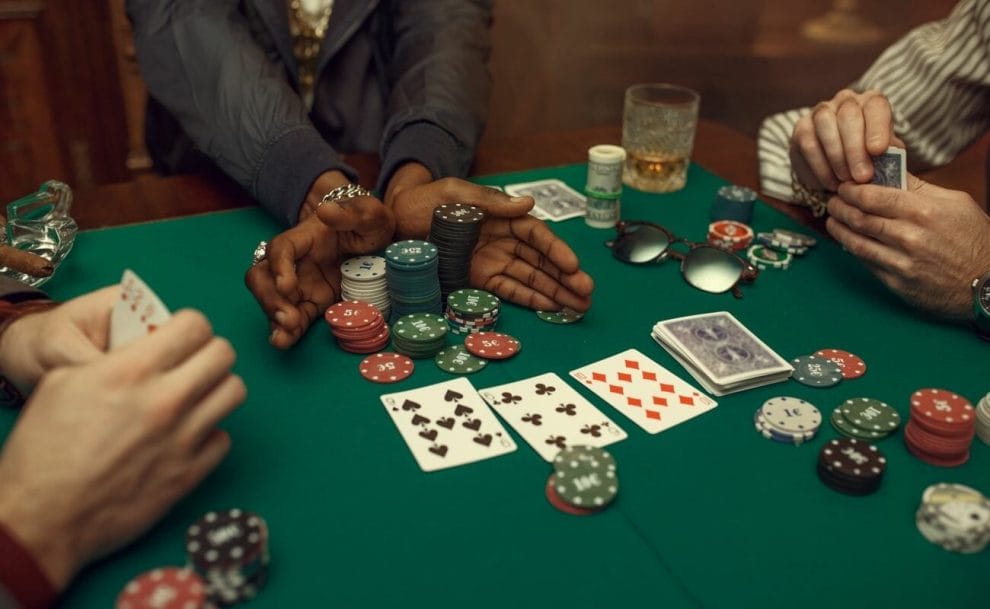
As a novice poker player, you may have heard people discussing something called “equity” but were unsure what they were talking about. Don’t worry, you’re not alone. Poker equity is quite an advanced concept in offline and online poker play. Even though it may be one of the more complex concepts to understand, it’s still one of the most important factors to consider when you’re learning how to play poker.
In recent years, the popularity of poker has consistently increased. But, with more people playing the game, players must do and know more to gain an advantage at the poker table. Due to the constantly evolving skill level of the general player pool, basic poker knowledge isn’t enough to win anymore.
If they want to be successful, players must have a solid understanding of poker math concepts, combined with strong intuition and strategic skills. Equity is one of the most fundamental concepts of poker math that players should strive to master. If you’re unfamiliar with its basic premise, this can seem intimidating. But don’t worry; this guide has been put together to help players better understand the principle. So, read on to discover what poker equity is, why it’s essential, and other ideas related to this aspect of high-level poker play.
What Is Equity in Poker?
In poker, equity refers to the portion of the pot you can expect to win based on the strength of your hand and the current situation in the game. It represents your probability of winning the hand at any point of the game, taking into consideration your current hand, the community cards, and the cards that could be dealt in the future.
Poker equity is a mathematical tool devised to guide your moves and maximize your chances of success in different hands. Understanding your equity is vital to playing strategically and making the most out of each situation at the poker table. Think of it as the percentage of time you should win a poker hand – if you have 70% equity, you’re expected to win 70% of the pot in similar situations over the long run.
Look at a hypothetical game where you are playing against one opponent. If you have a pair of aces versus your opponent’s pair of kings, you would have an equity of 81.06%. This means in the long run, you can expect to win about 81% of the pot. In this case, your opponent has an equity of 18.55%, and there’s a minimal chance of a tie (0.38%). So, assuming a pot of $100, $81 is “yours,” while $19 “belongs” to your opponent.
However, as the game progresses through different rounds – preflop, flop, turn, and river – the equity can change. For instance, if a king, queen, and a jack were to appear on the flop, the equity would swing in favor of your opponent, giving them an equity of 78.48%, you an equity of 20.71%, and a slightly higher chance of a tie (0.81%).
In a nutshell, equity helps you understand your likelihood of winning a poker hand. It considers your cards, the stage of the game, and the number of players in the game. It’s a tool that guides players in making informed decisions at the poker table.
Why Is Equity Important in Poker?
Understanding what your equity is at any point in a game can dramatically affect its outcome. Knowing when you should raise or go all in can increase your chances of winning a pot. It will also help you know when to call or fold to preserve your bankroll.
How To Calculate Equity in Poker

Technology has had a significant impact on the way people learn and play poker online. One of the most prevalent ways specific software has changed online poker is by introducing poker solvers and other tools to make understanding poker math easier. The most obvious way to determine equity is by using an equity calculator. These tools are easy to use and will provide detailed information about your chances of winning depending on your hand, your opponents’ hands, and the community cards. This is where things get complicated.
How Do I Calculate Poker Equity When I Don’t Know My Opponent’s Hand?
You may have noticed a “glaring issue” with equity and calculating it, namely knowing what your opponents’ cards are. Indeed, if you knew what your opponents’ hands were each time you played, you’d just fold or raise regardless. Yes, there’s no way to know exactly what cards your opponents hold, which means you must use equity in another way: by trying to estimate the range of your opponents’ cards.
When you don’t know a player, your range will have to be wide simply because you don’t know how they play. However, as you learn more about how they play poker, either in observing how they approach streets in a single game or by learning how they play over the course of multiple games, you’ll be able to narrow down the range and thereby gain a more accurate idea of what each player’s style is. This, in turn, gives you a better idea of what their range is and, therefore, what each player’s equity is.
How Range and Equity Work Together
The key takeaway from this is that you aren’t trying to figure out what your opponents’ exact hands are, but rather the range of hands they most likely have (be careful of good players who understand poker hand representation and how to manipulate it). This, in turn, can be used to calculate several possibilities when it comes to equity, which can then be used to give you an edge over your opponent.
Ultimately, though, these are just educated guesses. While it’s better than going in completely blind, there’s still the chance that you’re wrong about your opponents’ range, which will affect the accuracy of your equity calculations.
An Easier Way To Calculate Your Odds of Winning

If you don’t have access to a poker equity calculator (either because you don’t have one or are not allowed to use it) and you find the above method a bit too complicated; there’s an easier option to calculate your winning odds known as the rule of four and two.
When using the rule of four and two, you begin by tallying up your outs. Outs are the cards that could appear and make your hand a winning one. For example, if you have a 5 and a 6 and the community cards are 7, 8, and ace, you’d need a 4 or a 9 to complete a straight. There are potentially four 4s and four 9s that could help you win the game. That’s a total of eight outs.
Then multiply the number of outs you have by four or two, depending on whether it’s the flop (third street, with two community cards to come) or turn (fourth street, with one more community card to come). Here’s what it would look like written down if you continue with the hypothetical example from above:
- 8 outs x 4 = 32% chance of hitting a straight after the flop.
- 8 outs x 2 = 16% chance of hitting a straight after the turn.
Now, put these variables into an equity calculator and give your opponent a hand. The poker equity calculator comes up with the following equity values for your hand:
- 34.24% chance of a winning hand after the flop.
- 18.18% chance of a winning hand after the turn.
As you can see, the more straightforward method is not quite as accurate, but it’s pretty close and can still help you gain an edge on your opponents.
Hit the Poker Tables With Your Newfound Knowledge
If you’re interested in putting the things you’ve learned in this piece into practice, or you just want to have a good time relaxing and playing some online poker, be sure to check out what is on offer at Borgata Online. At the Borgata poker site, you can enjoy online poker cash games, exciting (and exclusive) poker bonuses, and exciting online poker tournaments if you want to take part in an even more competitive experience.
And if you want to take a break from online poker, you can also enjoy other exhilarating online casino games like craps, blackjack, roulette, and slots, as well as thrilling online sports betting — all with the same account.
Register at Borgata Online to join in all the gambling excitement.
